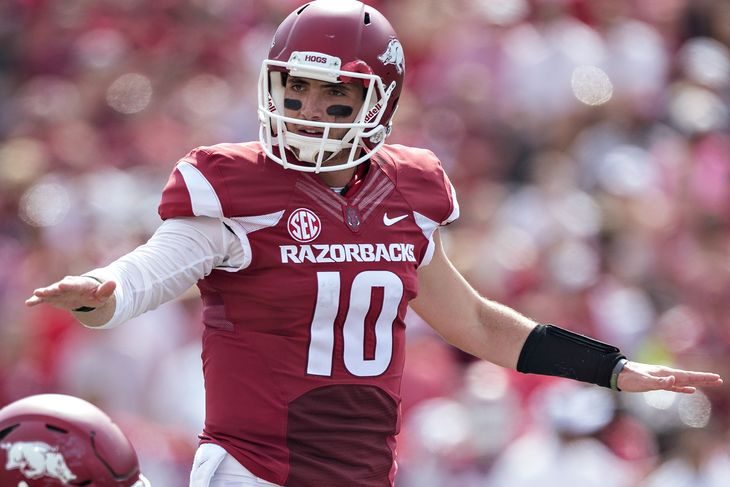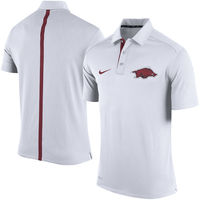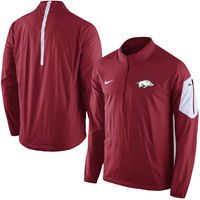It’s hard to believe that anyone expected a "must-win" this early in the season, but here we are, with third-year coach Bret Bielema suddenly facing a career-defining game. Lose, and the 2015 season becomes a desperate fight for a bowl; win, and the Hogs can get right back on track.
This early in the season, most advanced stats like S&P;+ are wildly inaccurate. I’ll refrain from using them until the sample size increases.
Running-Game-In-Being
Arkansas’ offense – which produced 10 points against Toledo – is having to follow a famous strategy in naval warfare.
In World War II, the German navy needed a way to form an effective navy without actually having to fight the British. Unable to compete with the British Royal Navy in the open seas, the Germans devised a brilliant plan. They kept almost all of their battleships together in the port of Wilhelmshaven, which is not too far from the British coast.
The British were faced with a conundrum. They could not attack the German fleet in port, but they also couldn’t move their navy away, or else the German fleet would sail out and cause trouble. So they had to keep their own fleet sitting in port, waiting for the Germans to move. With the threat of their surface fleet keeping the British tied down, the Germans were able to send submarines all over the Atlantic and disrupt Allied shipping. A fleet that profoundly influences strategy without ever leaving port is referred to as a fleet-in-being.
For now, Arkansas seems to have a running-game-in-being. Its threat (causing opponents to stack the box, leaving favorable pass-game matchups) is more valuable than actually using it (31 carries, 103 yards against Toledo). While I’m almost certain that Arkansas’ run-blocking will improve as the season progresses, until it does, expect a heavy dose of passes – but don’t be fooled: the run is still the core of Arkansas’ identity.
Texas Tech’s Defense
When we last met Texas Tech’s defense, they were giving up 438 yards and seven touchdowns to the Arkansas ground game. That paved the way for a 4-8 season in Lubbock.
This offseason, the Red Raiders hired Houston defensive coordinator David Gibbs. It was a reasonable and strategically-sound hire. At Houston, Gibbs focused not on yards and points (his Cougar teams gave up plenty of both), but on turnovers. Houston ranked top-5 nationally in turnovers forced in 2013 and 2014.
Head coach Kliff Kingsbury’s strategy is clear: he wants to create shootouts, and win them not with stops, but with turnovers. It’s the football version of 40 Minutes of Hell: it may give up points, but the turnovers it causes will create fast-breaks going the other way.
Kingsbury justified his hire in the season opener: Texas Tech outgunned Sam Houston State 59-45. Despite getting outgained 637-611 in yardage, the Red Raiders forced four turnovers.
Of course, that was Sam Houston State. The Kingsbury-Gibbs strategy in its ideal form is doing that to Baylor and Oklahoma, not an FCS school. SHSU rushed 46 times for 317 yards (6.9 yards per carry) and five touchdowns. If the Hogs can’t run on this team, it might be time to put a fork in the running game.
Texas Tech’s Offense
Tech eventually dumped Davis Webb as the starter last year and called up true freshman Patrick Mahomes, who looked good late last year. Mahomes is a pretty classic Tech quarterback: tall, big arm, runs the Air Raid well. He’s second in the NCAA with 786 passing yards (393 per game) and has eight touchdowns to one interception.
Tech will spread the ball around. Their leading receiver from last year, Jakeem Grant, leads the team with 212 receiving yards. Devin Lauderdale has 197 yards through the air as well.
On the ground, DeAndre Washington is back and leads the team with 212 yards and a healthy 8.5 yards per carry. Mahomes can scramble a little bit, having rushed for 71 yards, second on the team. I expect the Hogs to be fine against Tech’s running game, but the fear is getting short-passed to death, which was a concern against Toledo.
Also concerning has been Arkansas’ inability to pressure the quarterback. Texas Tech returns four starters up front and should give Mahomes plenty of time to operate, which is not a good thing for Arkansas. Last year, the Hogs were able to slow Tech’s offense by forcing turnovers (three) and keeping the running game in check, although the offense controlling the ball for 40 minutes was the decisive blow.
Keys to the Game
1. Don’t turn the ball over. Texas Tech’s new defensive coordinator places a premium on forcing turnovers. The Red Raiders will try to step in front of passes and will gang up to rip the ball away from ball-carriers. The Hogs haven’t fumbled yet this season, and the only interception came when a receiver fell down, but taking care of the football has to be a priority. If Arkansas doesn’t turn the ball over, it’s hard to see the Hogs scoring fewer than 45 or so points.
2. Win the matchups given. I’m somewhat worried with all the talk with week about "getting back to running the ball" that the Razorback offense will try to force the run game against Tech out of stubbornness. This would be a disaster if Tech is able to stop it (although that’s a pretty big "if"). If Tech wants to put eight in the box and leave Jared Cornelius open, then throw the ball to Jared Cornelius. Don’t overthink it.
3. Disrupt Tech’s offense. At over 60 points per game, Tech’s offense has hummed so far this year. They can throw deep, throw short, and run. Of course, they’ve played warm butter defenses, but Arkansas will be a victim if it can’t pressure Mahomes or stop the short passes. The Hogs have to do one of those, or else we’ll see 30+ completions on Mahomes’ stat line.
Key state of the game: Leverage rate. If you’ll recall from last year, leverage rate is the percentage of offensive snaps that are "standard downs." Standard downs are first down, second and less than 10, third and fourth and less than five. A low leverage rate means that the offense is constantly behind the sticks and forced to throw. If Tech’s short-passing strategy works, the Red Raiders will have a high leverage rate. If Arkansas can’t run, the Hogs will have a low one.










